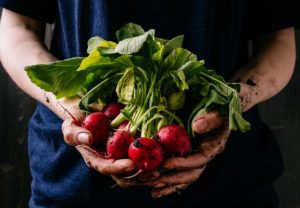Halal and Organic…Finally!
Although Halal is coming into its own as a food group, and Organic is already mainstream, the words Halal and Organic are rarely seen together.
In England you do not see them together because the organic associations do not agree with Halal slaughter so will not certify Halal products. In other places you might not see them together because the butchers only want to discuss low price not quality of the meat.
Unfortunately the Muslims are famous for wanting the lowest prices in their meat, and this is significant because, as statistics have shown, they eat the most meat.
Halal and Tayyib
However, if you go back to the Qur’an and you look for the word ‘Halal’ (permissible) where it refers to food, you will see it together with the word ‘Tayyib’ which means ‘good and wholesome’.
Basically this is the same as putting Halal together with Organic, and this is the food that has been recommended to the people who follow the teachings of the Qur’an, who are told to eat food that is “Halal and Tayyib”.
So you can imagine how pleased I was to discover one day an article on a man, whose shop is based just on the edge of Toronto, Canada, who is selling Halal Organic meat. Finally, I thought to myself, someone has understood the concept of Halal (permissible) and Tayyib (good and wholesome).
At the end of the day, surely it is better to eat less meat of good quality, than consume large amounts of meat of low quality. I will not digress into the health issues on this topic.
Convenience Food
Many Muslims these days allow themselves to eat the meat of the ‘people of the Book’, which is deemed permissible in the Qur’an, but they have given the term a much broader meaning which does not restrict them to eat the meat of believing Jews and Christians, who would be people following the books of the Torah and the Bible.
They have been told by religious scholars that it is basically acceptable to eat any meat, other than those types that are forbidden such as pork, in this time where finding Halal meat can be difficult in non-Muslim countries.
This has become a convenience for them, but what they are forgetting is that one of the main reasons for eating Halal meat is not just because of the blessing that is given during the slaughter, but because approximately three times more blood is pumped out of the Halal-slaughtered animal than from an animal that is slaughtered in the non-Halal way.
This means that the consumer is eating three times more blood left in the meat…which is the where the most toxins are stored.
Halal and Healthy
In a time where people are being warned about the diseases connected to eating beef, the awareness of the toxicity of the blood of the animal should be of major importance to them. Halal slaughter is one of the ways to help decrease this.
Now add to this the Organic aspect, that the animal is not being pumped with hormones and antibiotics and whatever other additives might be in the feed of non-organic animals, and you have a final product that is both Halal and good and wholesome for the consumer, just as has been recommended to mankind in the Qur’an.
I called the man interviewed in the article, Mr. Fahim Alwan, owner of BlossomPure. He began selling Halal Organic meat 7 years ago, and I asked him who his customers were. Were the Muslims buying his products or the general public? He said that probably 70% of the people who bought BlossomPure Halal organic meat from his store, and the organic stores he supplies to are non-Muslim. There are only 30% that are Muslim, but out of that 30% they probably account for 50% of his sales. Proof again that Muslims consume larger amounts of meat than non-Muslims. A huge market that gets quotes of billions and trillions of dollars for potential sales in any article on Halal.
He commented that the Muslims need to be educated on the organic aspect of meat in order to appreciate why it is worth paying the extra amount for the purity of the meat they are consuming.
With the work that is being done internationally with Halal, we have discovered that the Muslim consumer not only needs to be educated about the quality of their meat, and why organic might be preferable, but about eating Halal itself. They need to be reminded why it is important to eat Halal meat, and not just to distinguish it from pork, but to distinguish it from animals that have not been slaughtered in the prescribed manner, and so have high blood content left in them.
So I commend Mr. Alwan in his attempts to provide the Muslims with quality ‘Halal and Tayyib’ products, and I hope his customers, who come mostly by word of mouth, help educate other people on why they should also be looking for products of a permissible, good and wholesome nature.
Through this network, I hope he can grow his company to succeed, not only to get a share of those millions and trillions promised for the Halal producers, but also to get the Muslims back on track with eating the food that is Halal for them to eat.



